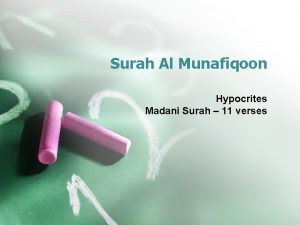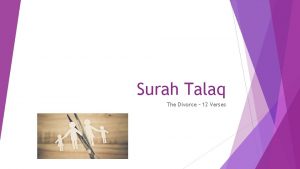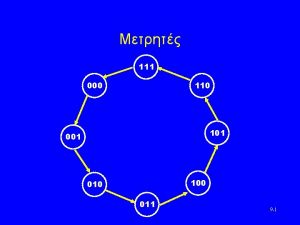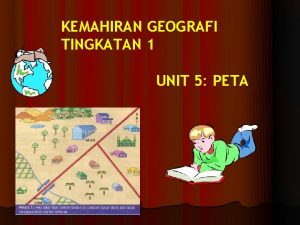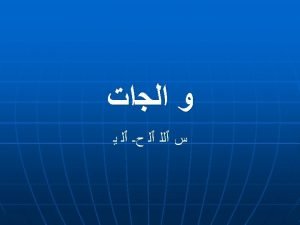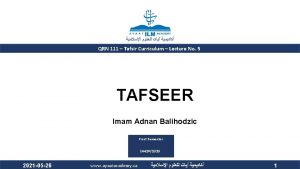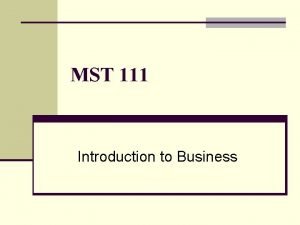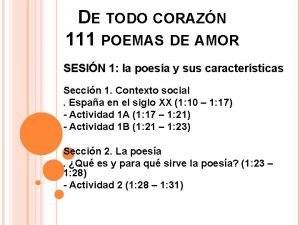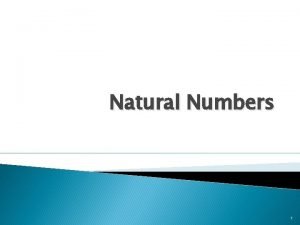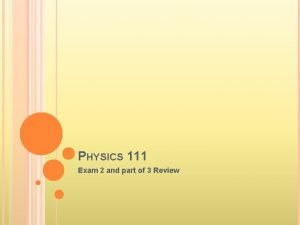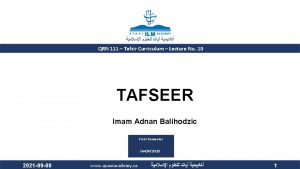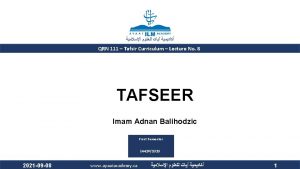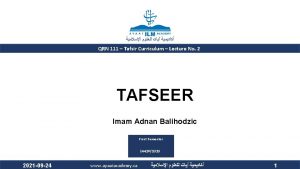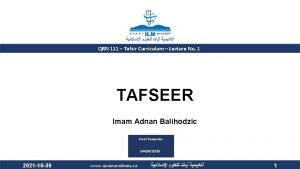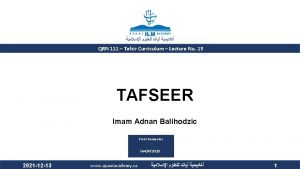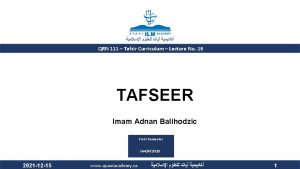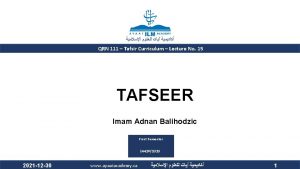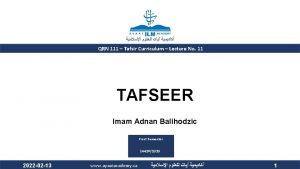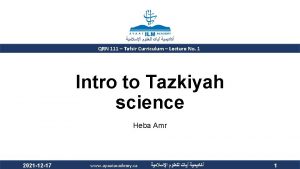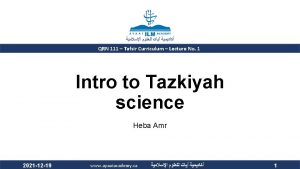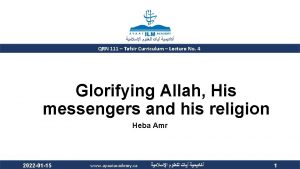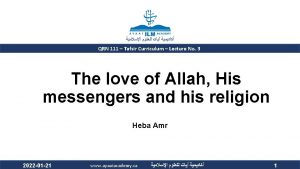QRN 111 Tafsir Curriculum Lecture No 3 TAFSEER















- Slides: 15

ﺃﻜﺎﺩﻳﻤﻴﺔ آﻴﺎﺕ ﻟﻠﻌﻠﻮﻡ ﺍﻹﺳﻼﻣﻴﺔ QRN 111 – Tafsir Curriculum – Lecture No. 3 TAFSEER Imam Adnan Balihodzic First Semester 1442 H/2020 2021 -02 -26 www. ayaatacademy. ca ﺃﻜﺎﺩﻳﻤﻴﺔ آﻴﺎﺕ ﻟﻠﻌﻠﻮﻡ ﺍﻹﺳﻼﻣﻴﺔ 1


Tafseer of Surah ‘Abasa ﺃﻜﺎﺩﻳﻤﻴﺔ آﻴﺎﺕ ﻟﻠﻌﻠﻮﻡ ﺍﻹﺳﻼﻣﻴﺔ • Name- after the word `abasa (He Frowned) with which it opens. • Period of Revelation- The occasion of the revelation of this Surah is unanimously agreed upon: Once some big chiefs of Makkah were sitting in the Prophet's assembly and he was earnestly engaged in trying to persuade them to accept Islam. At that very point, a blind man, named Ibn Umm Maktum, approached him to seek explanation of some point concerning Islam. The Prophet (upon whom be peace) disliked his interruption and ignored him. Thereupon Allah sent down this Surah. From this historical incident the period of the revelation of this Surah can be precisely determined. All around it indicates that this is one of the very earliest Surahs to be revealed at Makkah. Theme and Subject Matter- The commandment that the seekers of guidance should be given preference in conveying Allah's message. - Man is reminded to recognize his Creator. - On the Day of Judgement man will be so concerned about himself that he will not even care about his own mother, father, brother or children. 2021 -02 -26 www. ayaatacademy. ca ﺃﻜﺎﺩﻳﻤﻴﺔ آﻴﺎﺕ ﻟﻠﻌﻠﻮﻡ ﺍﻹﺳﻼﻣﻴﺔ 3


Tafseer of Surah ‘Abasa: Ayaat 1 -16 – The Basis of Social Values ﺃﻜﺎﺩﻳﻤﻴﺔ آﻴﺎﺕ ﻟﻠﻌﻠﻮﻡ ﺍﻹﺳﻼﻣﻴﺔ • “He frowned and turned away. When the blind man approached him. But how do you know? Perhaps he was seeking to purify himself. Or be reminded, and the message would benefit him. But as for him who was indifferent. You gave him your attention. Though you are not liable if he does not purify himself. But as for him who came to you seeking. In awe. To him you were inattentive. ” • In the opening verses Allah shows disapproval at the Prophet's annoyance on this occasion toward the blind man who had come seeking knowledge. He points out that such a humble person might actually benefit from the Prophet's time and effort more than others. That man was ʽAbdullāh bin Umm Maktūm, a maternal cousin of the Prophet’s wife, Khadījah. He was one of those who had accepted Islam during its early period in Makkah and had a deep desire to learn whatever he could. He approached the Messenger of Allah (PBUH), and unaware that he was occupied, began requesting his guidance on a matter. Unwilling to be interrupted at that moment, the Prophet showed displeasure in a way that could not be seen or known to the blind man, so that Allah admonished the prophet (PBUH) to do the best. Here the Messenger of Allah (PBUH) is addressed directly, but in a gentle manner. The one he ignored had been making an effort to be guided and purified; and he feared Allah. 2021 -02 -26 www. ayaatacademy. ca ﺃﻜﺎﺩﻳﻤﻴﺔ آﻴﺎﺕ ﻟﻠﻌﻠﻮﻡ ﺍﻹﺳﻼﻣﻴﺔ 5

Tafseer of Surah ‘Abasa: Ayaat 1 -16 – The Basis of Social Values ﺃﻜﺎﺩﻳﻤﻴﺔ آﻴﺎﺕ ﻟﻠﻌﻠﻮﻡ ﺍﻹﺳﻼﻣﻴﺔ • Ibn Umm Maktūm would benefit from the Prophet's instruction; therefore he was more deserving of his attention, and in the sight of Allah was far superior to the self-satisfied and unreceptive disbelievers. The unbeliever who thought himself-sufficient and in no need of his Lord's guidance would not accept the Prophet's message. The prominent chiefs of Quraysh had only met with him in order to negotiate and try to impose their own terms. They had been using all their wealth, power and influence to obstruct the advancement of Islam and prevent people from accepting it. Nevertheless, the Messenger of Allah (PBUH) hoped they might see the truth. Allah reassured His Messenger (PBUH) that he would not be blamed if he failed in his efforts to bring people to Islam. He was responsible only for conveying the message, not for their ultimate guidance, for that was in the hand of his Lord. Once he had conveyed the message, it was the responsibility of those who heard it to accept the truth and adhere to it. And those who refuse to be guided and purified merely damage their own souls. • “But as for he who came to you striving [for knowledge] while he fears [Allah]– from him you are distracted. ” Here Allah commands His Messenger to not single anyone out with the warning. Rather, he should equally warn the noble and the weak, the poor and the rich, the master and the slave, the men and the women, the young and the old. Allah will guide whomever He chooses to a path that is straight. He has the profound wisdom and the decisive proof. 2021 -02 -26 www. ayaatacademy. ca ﺃﻜﺎﺩﻳﻤﻴﺔ آﻴﺎﺕ ﻟﻠﻌﻠﻮﻡ ﺍﻹﺳﻼﻣﻴﺔ 6

Tafseer of Surah ‘Abasa: Ayaat 1 -16 – The Basis of Social Values ﺃﻜﺎﺩﻳﻤﻴﺔ آﻴﺎﺕ ﻟﻠﻌﻠﻮﻡ ﺍﻹﺳﻼﻣﻴﺔ • Naturally, when a caller to the Truth embarks on the mission of conveying his message to people, he wants the most influential people of society to accept the message so his task becomes easier. Almost the same attitude the Prophet (upon whom be peace) had adopted in the beginning, an attitude of sincerity and a desire to promote his mission and not out of respect for the rich people and hatred for the poor. • So, why was the Prophet criticized and why was this incident not ignored? It is because Allah had decreed for his Last Messenger to be of excellent conduct for all. He had to set an example for others. But Allah made him realize the correct method of extending invitation to Islam and his mission's point of view: every man, who was a seeker of the truth, was important, even if he was weak, or poor, and every man, who was heedless to the truth, was unimportant, even if he occupied a high position in society. • The address is to the Prophet sal. Allahu ‘alayhi wa sallam but the instruction applies to everyone. Also, it is part of the Qur’anic method to make use of isolated incidents in order to lay down fundamental and permanent principles. The point at issue here is not merely how an individual or a class of people should be treated. The matter is something far more important. It is: how should people evaluate everything in their lives and from where should they derive the values and standards necessary for such an evaluation. Allah’s Book should be our standard. Neither social circumstances, traditions, practices, nor any other source be allowed either to encumber or determine these values and standards. 2021 -02 -26 www. ayaatacademy. ca ﺃﻜﺎﺩﻳﻤﻴﺔ آﻴﺎﺕ ﻟﻠﻌﻠﻮﻡ ﺍﻹﺳﻼﻣﻴﺔ 7

Tafseer of Surah ‘Abasa: Ayaat 1 -16 – The Basis of Social Values ﺃﻜﺎﺩﻳﻤﻴﺔ آﻴﺎﺕ ﻟﻠﻌﻠﻮﻡ ﺍﻹﺳﻼﻣﻴﺔ • Upon reading the opening words of this Surah one feels that in this Surah Allah has expressed His displeasure against the Prophet (pbuh) for his treating the blind man with indifference and attending to the big chiefs exclusively. But in reading the whole Surah objectively, one finds that the displeasure, in fact, is expressed against the disbelieving Qureysh, who, because of their arrogant attitude and indifference, were rejecting the message of truth with contempt. • “Do not. This is a Lesson. Whoever wills, shall remember it. On honorable pages. Exalted and purified. By the hands of scribes. Noble and devoted. ” • This chapter begins with an emphatic expression of negation and refusal. Kallā is used to convey a forceful disagreement with what was stated or implied previously. No, this cannot be so. In no way is it acceptable to favor certain people over others on account of their social standing, even when the objective is a noble one. Thus, a new moral ethic was established within the Muslim ummah. Respect and appreciation for people was now to be based upon faith and taqwā rather than worldly considerations. This was a huge social revolution. These verses serve as a reminder for whoever would remember the admonition, and whoever would remember Allah. The Qur’ān itself has been called a reminder, for it reminds man of his Lord, his purpose on earth and of the conduct he should adopt. • The Qur’ān's verses are recorded in al-lawḥ al-maḥfūth, a noble, elevated record containing pure and honored texts which have been kept secure from human interference and alteration. Another meaning conveyed by Ibn Katheer is that the verses are recorded in a Book containing honored sheets or pages, referring to the Qur’ān. "Exalted" means elevated in status, and "purified" means excluding the human additions and deletions found in previous scriptures. Safarah are ambassadors, those who travel to deliver communications, and refers to the noble and obedient messenger-angels who were entrusted with the revelation – to guard and deliver it precisely in order to rectify matters among mankind. 2021 -02 -26 www. ayaatacademy. ca ﺃﻜﺎﺩﻳﻤﻴﺔ آﻴﺎﺕ ﻟﻠﻌﻠﻮﻡ ﺍﻹﺳﻼﻣﻴﺔ 8


Tafseer of Surah ‘Abasa: Ayaat 17 -32 – Man’s Arrogant Attitude ﺃﻜﺎﺩﻳﻤﻴﺔ آﻴﺎﺕ ﻟﻠﻌﻠﻮﻡ ﺍﻹﺳﻼﻣﻴﺔ • The second part of the Surah wonders at man’s conceit as he turns his back on the true faith. It wonders at how man forgets his humble origins, and how he remains totally oblivious of the care Allah has taken of him and His complete power over every stage of his existence, both in this life and in the hereafter. In his ingratitude man fulfils nothing of his duties towards his Lord, who has created and sustained him and who will hold him to account for his action. • “Cursed is man; how disbelieving is he!” He strongly denies the claims of his creation. Had he been mindful of these claims he would have been humbly grateful to his Lord who created him. The path of life has been smoothed for him. He has also been given the ability to recognize and follow the right path. When the journey of life is over, when every living being meets inevitable end, Allah swt provides him a grave. He honors man by making the earth his last abode, rather than leaving him as food for wild animals. He has made it part of human nature to bury the dead. When the time He has appointed arrives, He brings him back to life for the reckoning. So man will not be left without reward or retribution. “From what substance did He create him? From a sperm-drop He created him and destined for him; then He eased the way for him; then He causes his death and provides a grave for him. ” • But has man prepared himself for this reckoning? “No! Man has not yet accomplished what He commanded him, ” Man does not fulfill his commitment to His Creator. He remains negligent of his duties and does not thank and praise Allah. Man does not prepare himself in this life for the day of reward and retribution. In addition, the great majority of people arrogantly turn their backs on divine guidance. This applies to humanity as a whole. 2021 -02 -26 www. ayaatacademy. ca ﺃﻜﺎﺩﻳﻤﻴﺔ آﻴﺎﺕ ﻟﻠﻌﻠﻮﻡ ﺍﻹﺳﻼﻣﻴﺔ 10

Tafseer of Surah ‘Abasa: Ayaat 17 -32 – Man’s Arrogant Attitude ﺃﻜﺎﺩﻳﻤﻴﺔ آﻴﺎﺕ ﻟﻠﻌﻠﻮﻡ ﺍﻹﺳﻼﻣﻴﺔ • Next, the Surah invites man to reflect upon his food and that of his cattle, which is one of the great many things Allah has provided for him, “Then let mankind look at his food. ” Let man reflect: does he play any significant role in it? Had Allah not provided the means for it, man did not had the power to create it on his own. Every step of man’s sustenance is determined by the Supreme Will that creates man. Anyone reflecting on the growth of seeds and plants can recognize a divine plan. Rainwater penetrates the soil, and by the will of Allah tender sprouts miraculously push through the solid ground and grow to provide food for man as well as for creatures of the earth. • “How We poured down water in torrents, then We broke open the earth, splitting (it with sprouts), and caused to grow within it grain, and grapes and herbs, and olive and palm trees, and gardens of dense shrubbery, and fruit and grass. . ” It is He Who has created the seeds of countless species of vegetable; it is He Who has endowed these seeds with the quality that when they are sown in the soil, they should sprout up and from every seed vegetable of its own particular species should grow. Various kinds of vegetation. Those mentioned here were among the most common ones to people at the time and place of the Qur’ān's revelation. Ḥabb refers to all types of seeds and grains. Grapes are known. Qadhb are the moist green herbs upon which animals graze. Olive and palm trees were known to the Arabs; they provide fruits, juice, oil, seeds and shade. The gardens referred to as ghulb have been described as date-palm orchards, but more generally would include a thick growth of trees, vines and various other plants mixed and intertwined. Fākihah includes every type of fruit and also implies enjoyment. Abb was known to be the kind of grass and herbage that is eaten by grazing animals but not humans. • “(As) enjoyment for you, and for your grazing livestock. ” This is a means of sustenance not only for man but also for those animals from which man obtains food items such as meat, fat, milk, butter, etc. and which perform countless other services also for man’s living. Man benefits by all this and yet disbelieves in Allah Whose provisions sustain him. 2021 -02 -26 www. ayaatacademy. ca ﺃﻜﺎﺩﻳﻤﻴﺔ آﻴﺎﺕ ﻟﻠﻌﻠﻮﻡ ﺍﻹﺳﻼﻣﻴﺔ 11

Tafseer of Surah ‘Abasa: Ayaat 33 -42 – Some Faces on that Day will be Bright, Laughing and Rejoicing ﺃﻜﺎﺩﻳﻤﻴﺔ آﻴﺎﺕ ﻟﻠﻌﻠﻮﻡ ﺍﻹﺳﻼﻣﻴﺔ 2021 -02 -26 www. ayaatacademy. ca ﺃﻜﺎﺩﻳﻤﻴﺔ آﻴﺎﺕ ﻟﻠﻌﻠﻮﻡ ﺍﻹﺳﻼﻣﻴﺔ 12

Tafseer of Surah ‘Abasa: Ayaat 33 -42 – Some Faces on that Day will be Bright, Laughing and Rejoicing ﺃﻜﺎﺩﻳﻤﻴﺔ آﻴﺎﺕ ﻟﻠﻌﻠﻮﻡ ﺍﻹﺳﻼﻣﻴﺔ • The Judgment Day is the end of all delight and enjoyment. It fits perfectly with the planning and designing which included every stage of man’s development. The end portrayed here fits perfectly with the scene at the beginning of the Surah which shows someone coming forward with zeal and with a feeling of fear in his heart, and another considers himself-sufficient and turns away from divine guidance. • Al-Sakhkhah translated here as “the Deafening Blast” has been interpreted in different ways. Ibn ‘Abbas said, “Al-Sakhkhah is one of the names of the Day of Judgment that Allah has magnified and warned His servants of. ” Ibn Jareer said, “Perhaps it is a name for the blowing into Trumpet. ” Al-Baghawi said, “Al-Sakhkhah means the thunderous shout of the Day of Judgment. It has been called this because it will deafen the ears. This means that it pierces the hearing to such an extent that it almost deafens the ears. ” • When the trumpet will be blown people will be fleeing from their nearest and dearest ones lest they call them for help. It may also mean that when they see the evil consequences of committing sin for the sake of one another and misleading one another, fearless of Allah and heedless of the Hereafter, in the world, each one would flee from the other lest the other should hold him responsible for his deviation and sin. Brother will fear brother, children their parents, husband his wife, and parents their children lest they should become witnesses in the case against them. The fearfulness depicted in this scene is purely psychological. Each person will think only of himself. None shall have any time or power to think of others. 2021 -02 -26 www. ayaatacademy. ca ﺃﻜﺎﺩﻳﻤﻴﺔ آﻴﺎﺕ ﻟﻠﻌﻠﻮﻡ ﺍﻹﺳﻼﻣﻴﺔ 13

Tafseer of Surah ‘Abasa: Ayaat 33 -42 – Some Faces on that Day will be Bright, Laughing and Rejoicing ﺃﻜﺎﺩﻳﻤﻴﺔ آﻴﺎﺕ ﻟﻠﻌﻠﻮﻡ ﺍﻹﺳﻼﻣﻴﺔ • Then follows a description of the conditions of the believers and the unbelievers after the two groups have been assigned their values by divine standards and given their respective positions: • “[Some] faces, that Day, will be bright – laughing, rejoicing at good news, ”. These faces beam with a happiness overflowing with delight. They are hopeful and reassured because they feel that their Lord is pleased with them. These people are spared the terror of the stunning blast, so they can afford to smile and demonstrate their joy. Or probably the smiles and manifestations of happiness are seen after these people have realized the good end awaiting them. • “And [other] faces, that Day, will have upon them dust. Blackness will cover them. Those are the disbelievers, the wicked ones, ”. Such faces are covered with the dust of sadness and misery, darkened with humiliation and depression. They know what they have done in this life and they await their inevitable punishment. These people are devoid of faith. They do not believe in Allah or in the Divine message. Moreover, they are hardened in their erring and sinful ways. They persistently violate divine commandments. Those were the arrogant, self-satisfied ones who ignored and rejected the Prophet's invitation to truth and moral principles. Not only were they deniers of faith (kafarah), but persistent, rebellious and spiteful sinners (fajarah). It is most fitting that their compensation should be debasement and humiliation. • The destiny of each group is portrayed in their faces. The opening and the ending of the Surah are in perfect harmony. The opening lays down a fundamental principle and a general standard, and the ending shows us the results of applying this standard. 2021 -02 -26 www. ayaatacademy. ca ﺃﻜﺎﺩﻳﻤﻴﺔ آﻴﺎﺕ ﻟﻠﻌﻠﻮﻡ ﺍﻹﺳﻼﻣﻴﺔ 14

Discussion ﺃﻜﺎﺩﻳﻤﻴﺔ آﻴﺎﺕ ﻟﻠﻌﻠﻮﻡ ﺍﻹﺳﻼﻣﻴﺔ • The occasion of the revelation of this Surah is unanimously agreed upon, what was it? • What is a new basis of social values referred to in this Surah? • How will human beings behave during the Resurrection Day? • Describe the believers’ condition during the Resurrection Day. 2021 -02 -26 www. ayaatacademy. ca ﺃﻜﺎﺩﻳﻤﻴﺔ آﻴﺎﺕ ﻟﻠﻌﻠﻮﻡ ﺍﻹﺳﻼﻣﻴﺔ 15
 Surah munafiqoon tafseer
Surah munafiqoon tafseer Tafseer surah yusuf
Tafseer surah yusuf Surah talaq ayat 2
Surah talaq ayat 2 110 000 110 111 000 111
110 000 110 111 000 111 Classical mechanics
Classical mechanics Peta geografi tingkatan 1
Peta geografi tingkatan 1 Al hujurat tafsir
Al hujurat tafsir Tafsir bedeutung
Tafsir bedeutung Ciri kualitatif dan kuantitatif
Ciri kualitatif dan kuantitatif Attin surah
Attin surah Tafsir surah al infitar
Tafsir surah al infitar 01:640:244 lecture notes - lecture 15: plat, idah, farad
01:640:244 lecture notes - lecture 15: plat, idah, farad Mst 111
Mst 111 Poema de amor
Poema de amor Proof by mathematical induction
Proof by mathematical induction Physics 111 exam 2
Physics 111 exam 2
